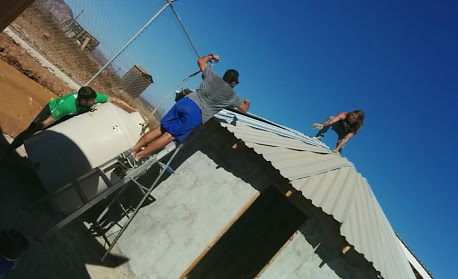What I learned in Punta Colonet

September 13, 2016
When I tell classmates that I went to México before the start of school, they think of Cabo San Lucas resorts, beaches and American amenities. Before my Aug. 25 trip to Punta Colonet, I had a similar mindset.
This trip was my first to México and for several hours it didn’t seem bad, maybe just a bit more busy, dirty and open than San Diego. We drove down the coast through Rosarito and Ensenada, stopped for tacos, and admired the wine country in the hills of Baja California.
About ten minutes past the wineries, the road got rough. That stretch of road was no longer paved and the van pulling the trailer of donations rattled slowly over the dirt and rocks. Someone exclaimed, “We’re really on a mission trip now.”
But that warning and stretch of dirt road couldn’t prepare me for the poverty I saw. I had never been out of the country or on a mission trip before, so to be dropped in one of the poorest “ejidos” in Mexico, jarred me.
An “ejido” is not even really a town; it is acres of land that the government sets aside for people who want to put it to use through farming, houses, schools and stores.
In my mind, “ejido” means dirt – dirt poor.
Punta Colonet, an ejido of about 3,000 people in Baja California, only has about four buildings that would (by American standards) be referred to as a home. Most homes had no electricity and no running water, just like our four cabins.
Our mission was to build a free daycare for children that will double as a hub for events during the weekend and eventually, even a skate park.
The compound on the top of a hill had four cabins, one outhouse and one soon-to-be-complete shower.
Despite the unfinished status of the property, kids still showed up. The young boys of the ejido ran and biked up the dirt roads to visit us. I don’t quite understand how they knew we were there, but they did.
I met three brothers José, Jesús and Yayier, all under the age of ten. They raised each other while their single mother, Cecilia, worked from 5:30 a.m. to 7 p.m., six days a week. Cecilia provides for them and their house made of stray cinder blocks and sheet metal.
One of the most impactful things I learned during these moments is that you don’t need a shared language to tell when someone has a kind heart. You know it, even if you don’t know every word they are saying. You can just tell.
I know, without a doubt, that their mother is raising three incredible young boys who are helpful, kind and loving despite the poverty they live in.
As they left our campfire that night, I told them I would see them again.
That is a promise I will not break.







Miguel Blanco • Oct 5, 2018 at 5:55 am
I just stumbled across this while looking into Colonet. Nice short story. Looks like it’s been a couple of years. Have you returned?